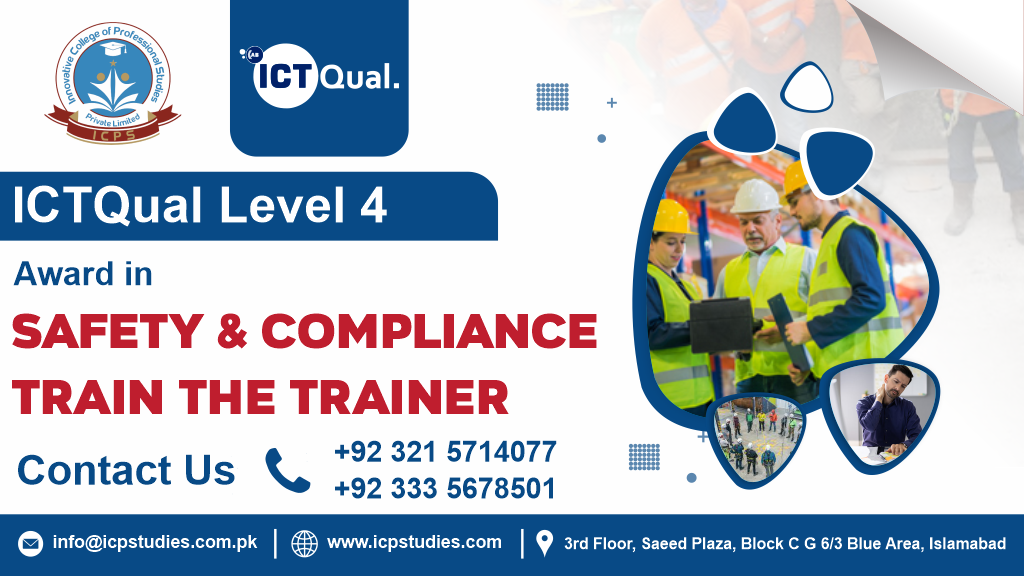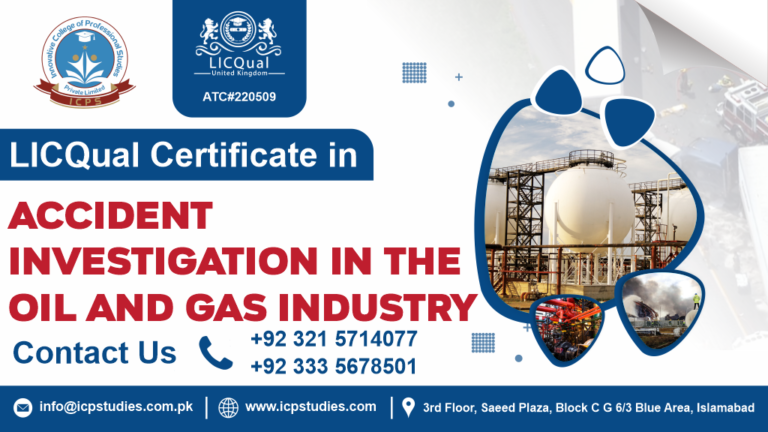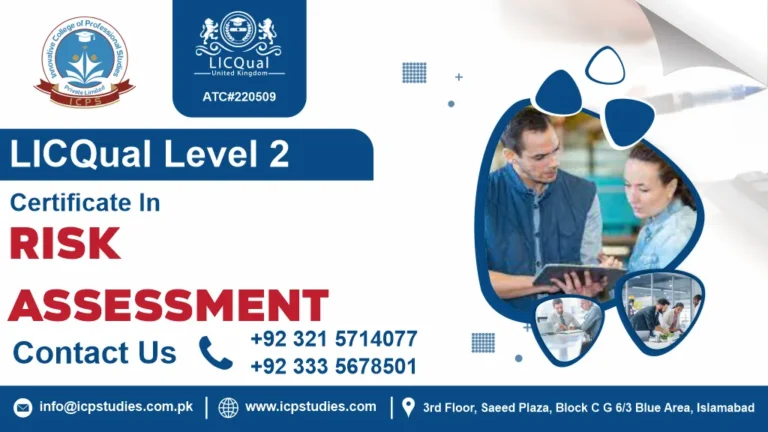In an era where safety and compliance are paramount in every industry, the demand for skilled trainers who can effectively impart these crucial principles has never been higher. Whether it’s in the realm of workplace safety, regulatory compliance, or environmental protection, organizations across the globe are seeking individuals who can not only understand these concepts but also teach them to others with clarity and authority.
The Level 4 Award in Safety and Compliance Train the Trainer program is typically delivered through a combination of classroom instruction, practical exercises, and assessments. Experienced trainers guide participants through the course material, providing insights, real-world examples, and personalized feedback to enhance learning outcomes.
In an increasingly complex and regulated business environment, organizations must prioritize safety and compliance to protect their employees, assets, and reputation. The Level 4 Award in Safety and Compliance Train the Trainer program equips individuals with the knowledge, skills, and certification needed to become effective trainers in these critical areas.
By investing in training and development, organizations can empower their workforce to uphold the highest standards of safety, compliance, and professionalism, ultimately driving success and sustainability in the long run.
All About ICTQual Level 4 Award in Safety and Compliance Train the Trainer
Course Overview
The Level 4 Award in Safety and Compliance Train the Trainer is a specialized training program designed to prepare individuals to become proficient trainers in the fields of safety and compliance. This certification program typically covers a wide range of topics related to safety regulations, compliance standards, and training methodologies.
Level 4 Award in Safety and Compliance Train the Trainer program may include safety managers, compliance officers, environmental health practitioners, quality assurance professionals, human resources specialists, and others responsible for ensuring adherence to safety and regulatory standards within their organizations.
Study Units
Admission Criteria
- Fundamentals of Safety and Compliance:
- Understand the foundational principles of safety and compliance within various industries.
- Identify key regulatory bodies and standards relevant to safety and compliance.
- Explain the importance of maintaining safety and compliance within organizational operations.
- Risk Assessment and Hazard Identification:
- Demonstrate proficiency in conducting risk assessments and hazard identification processes.
- Identify potential risks and hazards within different workplace environments.
- Develop strategies to mitigate risks and hazards effectively.
- Safety Training Design and Delivery:
- Design comprehensive safety training programs tailored to specific organizational needs.
- Utilize adult learning principles and instructional design methodologies to create engaging and effective training materials.
- Deliver training sessions that promote understanding, retention, and application of safety principles.
- Legal and Regulatory Compliance:
- Interpret and apply relevant laws, regulations, and standards related to safety and compliance.
- Ensure organizational practices and procedures align with legal requirements and industry standards.
- Provide guidance on compliance obligations and responsibilities to organizational stakeholders.
- Incident Investigation and Reporting:
- Conduct thorough investigations of safety incidents and near misses.
- Identify root causes of incidents and implement corrective actions to prevent recurrence.
- Prepare accurate incident reports and documentation in compliance with regulatory requirements.
- Emergency Preparedness and Response:
- Develop emergency response plans tailored to different types of emergencies.
- Coordinate emergency drills and training exercises to prepare personnel for crisis situations.
- Implement effective response measures to mitigate the impact of emergencies and protect personnel and assets.
- Behavioral Safety and Safety Culture:
- Analyze behavioral factors influencing safety performance within organizations.
- Implement strategies to promote a positive safety culture and encourage safe behaviors.
- Foster open communication and collaboration to address safety concerns and promote continuous improvement.
- Auditing and Compliance Monitoring:
- Conduct comprehensive audits to assess organizational compliance with safety regulations and standards.
- Identify non-compliance issues and areas for improvement through auditing processes.
- Develop corrective action plans and monitor progress towards achieving compliance goals.
- Training Evaluation and Continuous Improvement:
- Evaluate the effectiveness of safety training programs through assessment and feedback mechanisms.
- Utilize evaluation data to identify strengths, weaknesses, and areas for improvement in training delivery.
- Implement continuous improvement initiatives to enhance the quality and impact of safety training efforts.
- Professional Development and Growth:
- Pursue opportunities for professional development and learning in the field of safety and compliance.
- Stay abreast of emerging trends, technologies, and best practices in safety management.
- Demonstrate commitment to ongoing growth and improvement as a safety and compliance professional.
Ideal Candidate
- Educational Qualifications:
- Minimum educational attainment of a high school diploma or equivalent qualification.
- Some programs may require higher educational qualifications such as a bachelor’s degree, particularly in relevant fields such as occupational safety, environmental science, or related disciplines.
- Work Experience:
- Previous work experience in roles related to safety, compliance, or training may be required.
- Depending on the program, participants may need to demonstrate a minimum number of years of relevant work experience to qualify for admission.
- Professional Certification:
- Possession of relevant professional certifications or qualifications in safety and compliance may be advantageous or required.
- Examples of relevant certifications include Certified Safety Professional (CSP), Occupational Health and Safety Technician (OHST), or equivalent credentials recognized within the industry.
- Language Proficiency:
- Proficiency in the language of instruction (usually English) may be required, particularly for programs delivered in English-speaking countries.
- Applicants may need to provide evidence of language proficiency through standardized tests such as the TOEFL or IELTS.
- Prerequisites:
- Completion of prerequisite courses or training modules related to safety and compliance may be necessary.
- Applicants may need to provide transcripts or certificates demonstrating successful completion of prerequisite coursework.
- References or Recommendations:
- Submission of letters of recommendation from employers, supervisors, or other professional contacts may be required.
- References should attest to the applicant’s qualifications, work ethic, and suitability for the train the trainer program.
- Interview or Assessment:
- Some programs may require applicants to undergo an interview or assessment process to evaluate their suitability for the course.
- Interviews may assess factors such as communication skills, knowledge of safety and compliance principles, and motivation for pursuing training in this field.
- Legal Requirements:
- Compliance with legal requirements, such as background checks or health and safety clearances, may be necessary depending on the nature of the training program and industry regulations.
It’s important to note that specific entry requirements may vary depending on the institution offering the course and the jurisdiction in which it is delivered. Prospective participants should carefully review the admission criteria outlined by the training provider and ensure they meet all eligibility requirements before applying.
Learning Outcomes
The Level 4 Award in Safety and Compliance Train the Trainer course is ideally suited for a diverse range of professionals who are involved in or responsible for safety and compliance within their organizations. This course is particularly beneficial for individuals who aspire to become trainers or educators in the field of safety and compliance. Here are some examples of who this course is for:
- Safety Managers and Officers:
- Individuals responsible for developing, implementing, and overseeing safety programs within organizations.
- Safety managers seeking to enhance their training skills to effectively educate employees on safety protocols and regulations.
- Compliance Officers:
- Professionals tasked with ensuring organizational compliance with industry regulations, standards, and best practices.
- Compliance officers looking to broaden their expertise by becoming certified trainers in compliance-related topics.
- Environmental Health Practitioners:
- Professionals involved in assessing and managing environmental health risks within workplaces or communities.
- Environmental health practitioners interested in integrating safety and compliance training into their existing roles.
- Quality Assurance Managers:
- Individuals responsible for maintaining quality standards and processes within organizations.
- Quality assurance managers seeking to incorporate safety and compliance training as part of their quality management systems.
- Human Resources Professionals:
- HR professionals involved in employee training, development, and safety initiatives.
- HR specialists interested in expanding their skill set to include safety and compliance training for staff members.
- Training and Development Specialists:
- Professionals dedicated to designing and delivering training programs for organizational development.
- Training specialists looking to specialize in safety and compliance training to address specific organizational needs.
- Consultants and Auditors:
- Independent consultants or auditors providing advisory services or conducting audits related to safety and compliance.
- Consultants and auditors seeking to enhance their credentials and expertise in order to offer training services to clients.
- Individuals Seeking Career Advancement:
- Professionals from various industries who wish to advance their careers by gaining expertise in safety and compliance training.
- Individuals looking to transition into roles such as safety trainers, compliance officers, or environmental health specialists.
Overall, this course is suitable for anyone who plays a role in promoting and maintaining safety, compliance, and regulatory adherence within their organization, and who seeks to become a knowledgeable and effective trainer in these critical areas.
FAQs about ICTQual Level 4 Award in Safety and Compliance Train the Trainer







